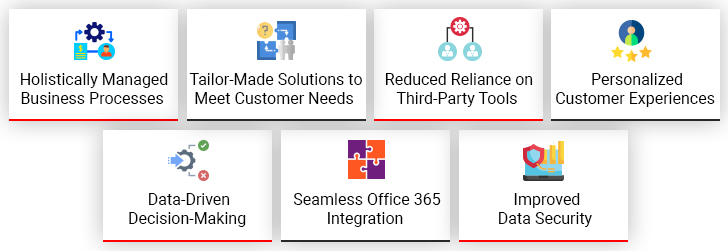The retail industry stands on the brink of a paradigm shift. Consumer buying patterns have fundamentally changed, with a pronounced shift towards digital and online buying. E-commerce behemoths such as Amazon and Alibaba have put tremendous pressure on traditional retailers, compelling them to invest heavily in building their digital presence. To maintain competitiveness and stay relevant in this volatile landscape, retail organizations need to build innovative solutions using modern technological tools and platforms and capitalize on the evolving preferences of today’s digitally empowered consumers.
Enter Microsoft’s Power Platform-a comprehensive suite of tools that have revolutionized how businesses interact with customers, manage operations, and make data-driven decisions. By combining powerful capabilities for app development, workflow automation, and data analysis, the platform helps retailers deliver customer-centric experiences, optimize business processes, and fast-track transformation. With Power Platform, retail organizations can successfully navigate the complexities of a dynamic marketplace and pave the way for the future. No wonder, Microsoft Power Platform has been named a leader in the 2023 Gartner Magic Quadrant for Enterprise Low-Code Application Platforms for the fourth year in a row.
In this blog, we will explore how Power Platform can be a game-changer for the retail sector, modernizing processes and driving transformative outcomes.
Microsoft Power Platform-A Comprehensive Solution for Retailers
A low-code development space, Power Platform comprises enterprise-grade tools and platforms such as Power Apps, Power Automate, Power BI, Pages, and Power Virtual Agents. Power Platform can also connect with Dynamics 365, Office 365, Azure Cloud, and even third-party applications. By synergistically combining these tools, retail organizations can elevate their productivity and take their business to a whole new level.
Let’s dive into the capabilities of each of these tools one by one.
Power BI: Generate Insights for Informed Decision-Making
A full-suite data intelligence platform, Power BI enables organizations to tap into various data sources, and present real-time insights in the form of easily comprehensible charts, reports, and dashboards. With over 70 connectors, the tool can be connected to platforms of various complexities ranging from Microsoft Excel and SQL servers to Google Analytics. Decision-makers in the retail industry can leverage Power BI to identify market opportunities, monitor KPIs, spot industry trends, and more.
Case in Focus: Leading Retailer Optimized Inventory Management with Power BI-Driven Dashboards
A California-based multi-door retailer sought a powerful analytics and visualization solution to leverage massive volumes of data generated across various touchpoints. They wanted to eliminate their reliance on Excel spreadsheets and manual data handling.
Damco’s Power BI experts collaborated with the client to build a Power BI-driven solution for advanced reporting and visualization. The solution enabled the retailer to consolidate data from all sources (Excel sheets, POS, etc.), visually capture key metrics through custom reports and dashboards, and realize a whopping 30% reduction in inventory costs. Read the full story.
Power Apps: Enhance Business Agility with Custom Applications
Diverse customer requirements and changing market conditions have accelerated the rise of bespoke applications built using drag-and-drop interfaces and pre-built templates, establishing a paradigm of low-code development. Microsoft Power Apps, built upon this concept, enables developers and non-developers to build and deploy custom applications in just a few weeks-not months-and that too with a minimum budget.
Power Apps comes with infinite possibilities. From employee onboarding, inventory management, and order management, to supply chain management and POS, retailers can use its point-and-click approach to turn their business ideas into brilliant apps-really fast.
Here’s how Power Apps enables innovation:
-
Customized, Role-Based Applications: Businesses can solve their most pressing operational challenges and clear development backlogs by building applications up to 10 times faster.
-
Easy-to-Learn for Citizen Developers: With an intuitive point-and-click approach and a large range of ready-to-use templates, Power Apps empowers employees to become citizen coders and turn their ideas into value-driven apps.
-
Single Source of Truth: By integrating data from 300+ different sources, users can make sure their organizational data always remains accurate and up-to-date.
Power Automate: Drive Productivity with Automated Workflows
Also known as Microsoft Flow, Power Automate enables business users to seamlessly incorporate automation into applications and services. In an age when retail organizations are constantly optimizing their environment for efficiency, Power Automate helps users automate simple, rule-based tasks, send automatic notifications, and schedule data movement between systems-all without writing any code.
For example, businesses can harness the platform to create workflows for extracting and transferring survey answers from questionnaires or for automatically saving email files to SharePoint.
Three kinds of workflows can be built using Power Automate:
-
Automated: These workflows are triggered when a pre-defined condition is met. For instance, an email gets delivered once a task is finished.
-
Scheduled: These workflows are scheduled to run at a particular time of the day, week, or month.
-
Instant: These start at the click of a button and can be used across both desktop and mobile devices.
Power Virtual Agents: Create Intuitive Chatbots to Boost CX
Delivering top-notch customer support is of the essence in this day and age. Retailers can alleviate the burden on their support agents by building intelligent AI-powered chatbots using Microsoft’s Power Virtual Agents, a SaaS low-code platform.
Power Virtual Agents can also be integrated with other tools from the Power Platform suite such as Power Automate which means virtual agents can trigger a workflow based on users’ responses and complete a task as required.
Virtual assistants created through the platform can answer common customer queries, direct users to the right resources, or escalate the query to human agents if required. Retail organizations can harness the power of chatbots to boost customer service, shorten turnaround time (TAT), and free up human agents for business-critical tasks.
Key Benefits of Microsoft Power Platform for Retailers
A holistic application suite, Microsoft Power Platform can empower retailers to ensure hassle-free operations and deliver client-centric solutions. While most of the organizations have invested individually in the core components, the latter can be integrated synergistically to improve business operations.
- Holistically Managed Business Processes
Microsoft Power Platform provides an enterprise-grade platform where organizations can manage all kinds of data, maintain a single source of truth across all departments, and access actionable insights to gain an edge in an immensely competitive industry.
- Tailor-Made Solutions to Meet Customer Needs
Power Platform comes with a visual design approach, eliminating the need for hand-based coding and accelerating the development process to close the digital gaps in an organization’s transformation journey. Digitizing processes and operations helps retailers eliminate redundancies and deliver client-centric experiences.
- Reduced Reliance on Third-Party Tools
By combining the power of analytics, design, development, and automation on a single platform, Power Platform eradicates the need for recurring subscriptions and cost controls.
- Personalized Customer Experiences
With Power Apps, retailers can develop tailor-made applications that effectively capture customer behavior and preferences. These applications can be integrated with their existing data sources including CRM systems to get a 360-degree view of the customers. Enhanced insights into customer behavior help retailers deliver personalized offers, recommendations, and experiences.
- Data-Driven Decision-Making
In an industry that generates an overwhelmingly large amount of data, retailers often struggle to glean value-driven insights. Power BI enables businesses to combine and analyze data from various sources and convert raw data into informative visualizations and reports.
- Seamless Office 365 Integration
Power Platform can be easily integrated with Office 365, helping retail businesses effortlessly manage organizational data while simplifying complex business processes and tasks.
- Improved Data Security
Since retail businesses deal with sensitive customer data, they need to implement safeguards to keep cyberattacks at bay. Being a Microsoft offering, Power Platform comes with built-in security measures and access controls. Additionally, Power Platform runs on Azure, a robust cloud infrastructure that guarantees the highest degree of data security and compliance.
Boost Retail Success with Power Platform Solutions
The Final Word
Power Platform is not just a set of tools; it is a catalyst for transformation in the retail industry. By unifying data, streamlining processes, and enhancing customer engagement, Microsoft Power Platform solutions empower retailers to successfully overcome the challenges of the modern marketplace. As the retail landscape continues to evolve, embracing the capabilities of Power Platform is a strategic imperative for those looking to thrive in the digital age.







